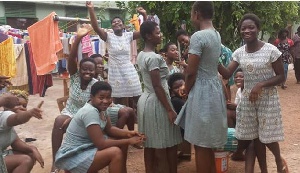Senior High School (SHS) students on the double track system are currently complaining about the limited time they had to cover the syllabus ahead of their end-of-semester examinations.
Some students on the Green Track have expressed pessimism about their chances of passing their upcoming exams.
Accra-based Citi FM reports that some of the students complained about inadequate contact hours, coupled with the huge workload from their syllabus have made them ill-prepared to sit for the examination.
“I am somehow afraid because the teaching and learning days are inadequate. The teachers also go strictly to the syllabus where a topic can take two weeks for it to be fully treated. So, we are not able to cover anything,” one student is quoted as saying.
“We are not prepared. The topics are very broad to be completed in this short time. The teachers keep skipping the topics because of time,” another added. Last year, government announced that the double track system will be deployed, starting with the academic year in September.
The double track system, government said, was being deployed as a means of addressing challenges with the implementation of the free SHS policy.
This particular system of education divides the entire student body and staff into two different tracks; so while one track is in school, the other is on vacation.
The government further announced that some 400 out of the 696 public SHSs have been selected to operate the system.
But former President John Dramani Mahama has been one of the stern critics of the double track system, insisting he will abolish it should he be voted president in 2020.
“I will also work hard to abolish the double track system in the shortest possible time. We will do this by investing massively in the expansion of school infrastructure such as additional classroom blocks and dormitories and the completion of 200 Day schools popularly known as E-blocks that we started to enable our children attend school at the same time and have adequate contact hours with their teachers,” Mahama said.
General News of Tuesday, 8 January 2019
Source: yen.com













